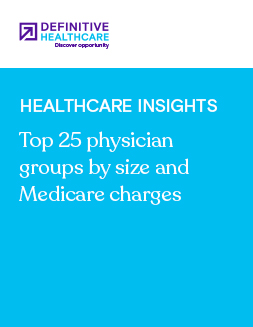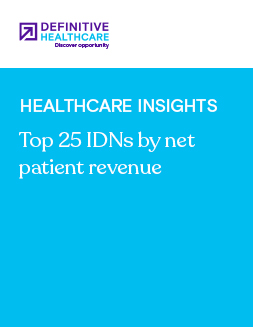Healthcare Insights
Which states have the top behavioral health referrals?
In recent years, issues like the COVID-19 pandemic, the state of the economy, and other global concerns have put a significant strain on behavioral and mental health, shedding more light on the critical need to better serve this patient population. As awareness surrounding behavioral and mental health conditions increases, new opportunities in the market have appeared. As a result, payors, healthcare providers, employers, and government policymakers are investing in new partnerships, technologies, and support.
The top 10 states with the most behavioral health referrals
We used our Atlas All-Payor Claims dataset to examine the top behavioral health referrals across all 50 states and the District of Columbia. Understanding patient referral patterns is essential for healthcare providers and other organizations. For example, referral patterns help them understand their market, improve network utilization, align their services with patient need, strengthen physician relationships, and inform investments.
The following table lists the top ten states with the largest percentage of behavioral health referrals out of the total behavioral health referrals in the country in the calendar year 2022.
| Rank | State | % of referrals | Explore dataset |
|---|---|---|---|
| 1 | Ohio | 12.5% | Explore |
| 2 | New York | 11.8% | Explore |
| 3 | California | 6.7% | Explore |
| 4 | Michigan | 6.0% | Explore |
| 5 | Kentucky | 4.6% | Explore |
| 6 | Florida | 4.1% | Explore |
| 7 | Indiana | 3.5% | Explore |
| 8 | Massachusetts | 3.3% | Explore |
| 9 | Minnesota | 3.3% | Explore |
| 10 | Texas | 3.2% | Explore |
Fig. 1 Data is from the Definitive Healthcare Atlas All-Payor Claims Database and represents physician to physician referral claims for January – December 2022. Data is accurate as of February 2023.
Which states have the highest percentage of patient referrals?
Four Midwest states (OH, MI, IN, MN), two Northeast states (NY, MA), two Southeast states (KY, FL), one Southwest state (TX), and one Western state (CA) made the top ten list. While the highest concentration of states is in the Midwest, states across the country are represented on the list.
In first place on this list is Ohio, which made up 12.5% of the total referrals from behavioral health specialists. Interestingly, despite having the highest volume of referrals, Ohio is not in the top five most populous states, according to the United States Census Bureau’s 2022 annual estimates of the resident population for the United States, regions, and states.
New York, which is the 4th most populous state according to the United States Census Bureau, is in second place with 11.8% of the behavioral health referrals. California is ranked number 1 as the most populous state, but only ranked number 3 for behavioral health referral volumes (6.7%).
Which top 10 states have core based statistical areas (CBSAs) with high behavioral health referral volumes?
We also took this analysis a step further to examine 923 core-based statistical areas (CBSAs). CBSAs are U.S. geographic zones of at least 10,000 people, as defined by the Office of Management and Budget (OMB). Healthcare providers, regulatory agencies, and payors often use CBSAs to understand markets encompassing urban centers and their surrounding counties, as well as address population health issues.
Within the first-place state, Ohio, there were three CBSAs that made the top 10 CBSA list: Cincinnati OH-KY-IN (#6); Cleveland-Elyria OH (#9); and Columbus OH (#10).
New York had the CBSA with the highest behavioral health referral volumes (New York-Newark-Jersey City NY-NJ-PA). This likely contributed to the state of New York’s #2 position on the list.
California (#3), Michigan (#4), and Massachusetts (#8) also had CBSAs in their states make the top 10 list.
Interestingly, about a third of the top 10 states did not have any CBSAs in these states make the top 10 list. This suggests that behavioral health issues are more predominant across the entire state rather than concentrated in a single area.
What is behavioral health?
Behavioral health refers to mental health, substance use disorders, physical symptoms related to stress, and life stressors and crises. Behavioral health care refers to the prevention, diagnosis and treatment of those conditions. It is prevalent across all ages in the United States. People with behavioral health conditions can be more likely to develop chronic diseases, struggle with stable employment or housing, or involved in the criminal justice system.
What is the difference between mental health and behavioral health?
Behavioral health and mental health are related but distinct. Behavioral health generally involves how people respond to situations and the actions they take. Behavior disorders may include substance abuse, addiction, self-injury, or eating disorders.
On the other hand, mental health involves thoughts and feelings that influence people’s mental states. Mental health is often considered as fitting under the broader behavioral health umbrella. Common mental health disorders may include depression, generalized anxiety disorder, bipolar disorder, or schizophrenia. Those who have mental health conditions may benefit from behavioral health techniques and principles.
What is a behavioral health professional?
Behavioral health professionals treat behavioral health issues. Common behavioral health professions may include substance abuse counselors, school psychologists, clinical health psychologists, and addiction psychiatrists. Common mental health professions may include family therapists, mental health therapists, psychiatric nurse practitioners, and gerontological social workers.
These healthcare professionals may provide behavioral therapy, which is a range of evidence-based approaches to address behavioral conditions. Examples of some types of behavioral health therapy include cognitive behavioral therapy (aka CBT therapy), acceptance and commitment therapy (ACT), dialectical behavioral therapy (DBT), and psychotherapy.
Learn more
Healthcare Insights are developed with data from the Definitive Healthcare platform. Want even more insights? Start a free trial now and get access to the highest quality healthcare commercial intelligence on hospitals, physicians and other healthcare providers.


